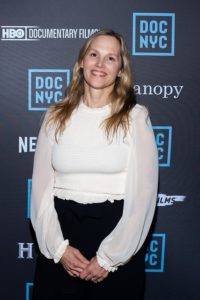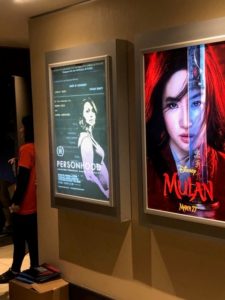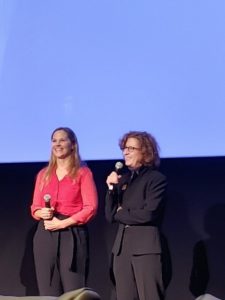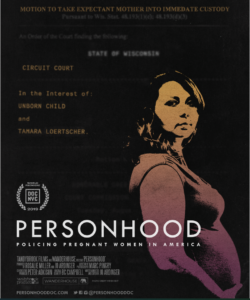Maheen The Globe interviews Jo Ardinger, Seattle-based filmmaker, making her directorial debut with Personhood. This reproductive justice documentary explores the criminalization of pregnant women as seen through the eyes of a young mother swept up in dangerous new laws. Personhood’s World Premiere took place on November 8, 2019 in New York at DOC NYC, the largest documentary festival in the United States. This year, DOC NYC offered over 300 films and events, including 28 world premieres and 27 U.S. premieres, with 135 feature-length movies. Personhood made it to Film Today’s top 10 documentaries from DOC NYC by film critic Christopher Reed. What a success!

Jo Ardinger fact-file: Ardinger is an award-winning editor, producer, and director. She is an active member of the Seattle film community. She has worked in both documentary and narrative. Recent documentary editing credits include Beyond the Visible: The Story of the Very Large Array, narrated by Jodi Foster (Media Interpretive Award, Cine Golden Eagle, Telly); and the PBS documentary, Into Deepest Space: The Birth of the ALMA Observatory. Other work includes additional editing credit on Imba Means Sing (Best Humanitarian Documentary, Global Film Awards, 2016), and the Discovery HD series, Fantastic Festivals of the World. Ardinger is also an instructor at the University of Washington in Seattle, where she teaches digital storytelling in science.
Here, she dives deeper into the term “Personhood,” its legal and philosophical implications, and the key takeaways of the film and what it plans on achieving.
How did the project Personhood come about? What inspired you to work on this sensitive subject matter?
I started my film career later in life as a freelance editor. I worked on some really exciting science documentaries and narrative films, but I couldn’t shake the feeling of wanting to make my own films with a focus on social justice storytelling. This was all happening in the wake of the 2010 elections, which had kicked off an avalanche of laws restricting women’s reproductive rights. When I learned about the fetal personhood movement and what that meant for the status of women in society, I was really motivated to get that story out into the world. On a personal level, my daughter was in her late teens at the time, and imagining a world where her fetus would have more rights than her was really terrifying.

What does the term “Personhood” mean? For those who don’t know. And what are its legal implications?
The term personhood can mean different things depending on where you live in the world or whether you’re looking at it through a religious, philosophical, or legal lens. In the United States, personhood is a legal status given to citizens upon birth. The rights of personhood are laid out in the 14th Amendment of the Constitution and include the rights to privacy, liberty, medical decision making, and due process. Our film deals with the push to extend these rights to fertilized eggs, embryos and fetuses, and how that impacts the fundamental rights of pregnant women.

How can a fetus have its own attorney? It’s a concept that’s hard to visualize.
This is one of the things that shocks people the most when they hear the details of what happened to Tammy, the woman at the center of our film. It’s beyond most people’s imaginations that something inside of you could have its own attorney that takes a position adversarial to you, but this is exactly what Wisconsin’s ‘Unborn Child Protection Act’ allows. In the US, people take for granted that citizens are afforded the right to an attorney, but because of the way Wisconsin’s law is written, Tammy was actually denied access to a court-appointed attorney. During her initial court hearing, the attorney for her fetus argued that Tammy should be detained, and that’s exactly what happened. This is the insanity that comes with these unconstitutional laws. They give the state incredible power to police and punish a pregnant woman for their behavior.
What were the constitutional rights Tammy was denied?
In a country that prides itself on being the land of freedom and liberty, it’s hard to digest how many of Tammy’s fundamental constitutional rights were violated. Her right to privacy in medical decision making was immediately violated at the hospital when her medical records were shared with state authorities without her permission. We all have the right to accept or refuse medical treatment, and that doesn’t go away when someone becomes pregnant. There was also a violation of her 4th Amendment right because this was essentially a government search and seizure of her confidential medical information without showing probable cause that a crime had been committed. Her right to due process and liberty were violated. And ultimately Tammy’s right to carry a pregnancy to term without undue burden was violated. Contrary to their stated purpose, these laws actually drive women to get abortions, because the legal problems and harsh punishments go away if they’re no longer pregnant. Tammy wanted her pregnancy but had to suffer through harassment and jail time in order to keep it.

Exciting times for you and your team. Why do you think people should watch this movie?
Everybody has someone in their lives who can become pregnant. Depending on where you live, pregnancy can mean becoming a second-class citizen with a special set of laws that apply only to you. This film is really a warning about extreme governmental overreach into women’s lives. We recently learned that a Missouri state official had been keeping track of women’s menstrual cycles on a spreadsheet. My jaw dropped when I read that. People need to understand what’s at stake so they can try to protect themselves and their loved ones.

What is the key takeaway of this film?
I hope that when people leave the theater, they feel both outraged by what’s happening and motivated to take action. I want people to feel fired up enough to vote in local, state, and federal elections because voting is our most powerful tool with this issue. These laws are made and enforced by state representatives, judges, and district attorneys, so it really matters who holds these offices. Find out who supports these regressive policies and then vote them out!

Maheen Mustafa is the writer of this article. She is the Editor-in-Chief/Founder of Maheen The Globe LLC, a Seattle-based, independent, woman-owned media company and online global magazine covering food, travel, coffee, health & education, global business, global culture (art, sport, film, fashion, music, dance). It also contains special features/editorials/interviews of celebrities, top global influencers, women-led small businesses with a special focus on moms, first generation and second generation immigrants and Pakistani Americans. Key topics: Mental health, physical wellness, motherhood, postpartum depression, women empowerment, education and social justice. Regions covered: Local neighborhoods (Fremont, Ballard, Seattle downtown, West Seattle, So-Do), Nationwide (USA), Pakistan and worldwide. #globalperspective
Follow Maheen on:
